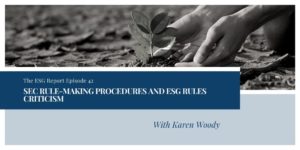
Tom Fox is back for a new episode of The ESG Report. He’s joined by Professor Karen Woody, and they go inside the SEC to take a look at the process and procedure, as well as the arguments made against the recently proposed rule around ESG.
The Proposal Process
“These rules aren’t just picked from the sky,” Karen explains. There are a number of people at the SEC who come together to devise these rules, with a lot of time being spent working through the proposal process. After the rule is written, the public has 60 days to comment on it, and once this period ends, the SEC takes these comments under advisement to promulgate a final rule.
Challenging the Dissent
Karen points out that in the past, there has always been dissent whenever a rule was proposed in the SEC. However, the recent presence of dissent at almost every turn in the commission has created what feels like a very political space that – according to Karen – isn’t doing anyone any favors.
A major argument that was raised is that promoting rules about climate does not lie within the SEC’s scope of authority. Karen disagrees; she states, “It would be hard to find an industry that won’t be touched by a climate event,” citing the many corporate sectors that would be negatively affected should a climate emergency occur.
Another big point of issue was that investors don’t care about ESG. To rebut this, Karen brings up the Conflict Minerals Regulation, and how it is the perfect counterpoint to ESG. ESG is an investor-led movement, because people do want to know how green companies are.
Challenging a Final Rule
The procedure of challenging an SEC rule once it becomes final differs depending on where the challenge comes from. “The SEC is its own mini country,” says Karen, because they write and enforce their own rules, and the commission has its own court with an appointed administrative law judge. She explains the legal process that is involved with filing a lawsuit against the Securities and Exchange Commission should one wish to challenge a final rule, which involves answering to their administrative law judge, and eventually to an Article III court.
RESOURCES
Tom Fox’s email
Karen Woody | LinkedIn | Twitter





